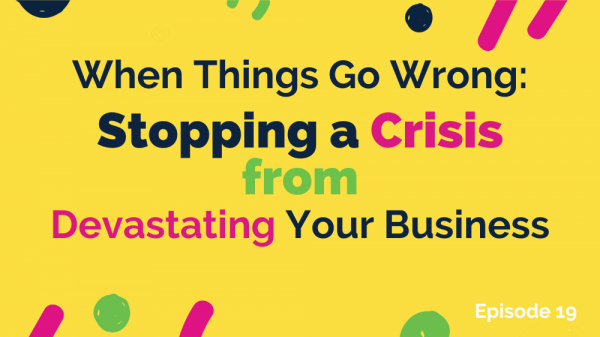The potential for something to go wrong within a business is high these days. And the sad thing is, too many businesses are in denial about the importance of crisis communication and needing to be proactive and plan how to communicate in a crisis so that they protect their business and their livelihood.
It takes years, even decades to build a strong and trusted brand, and it takes just seconds to tear it apart. So today we’re talking about managing crisis communication and what you need to put in place now, to better protect yourself and your business from the damage a crisis can cause.
I’ve worked in marketing and public relations for over 25 years and in that time I’ve managed more than my fair share of business crises, both big and small, and learned the hard way, what happens when you don’t have a plan.
In this episode you’ll hear:
- The importance of crisis communication
- The three parts of a crisis communication plan
- What you need to put into your plan no matter what size your business is
Thanks so much for listening. If you love what you’ve just heard, please share this podcast with your friends, family, and colleagues.
Share The Love
If you love what you’ve heard, please share this podcast with your friends, family, and colleagues. Support the show by taking some time to leave a review at https://ReviewThisPodcast.com/SSOMPodcastW. Thanks!
And a big thank you to Ricky_ardila for their lovely review:
“Nicci… you have made my life so much easier. It is so hard when starting your own small business to also spend a huge amount in marketing. So this podcasts have made a huge impact in our business, its all explain so easily and good to follow. Seriously you are AMAZING!”
Podcast Transcript: Importance of Crisis Communication
Nicci O’Mara
It takes years, even decades, to build a strong and trusted brand, and it takes just seconds to tear it all apart, the potential for something to go wrong within a business, and then the story of it to spread like wildfire, is high these days. And the sad thing is too many businesses are in denial about needing to be proactive and plan how to communicate in a crisis so that they protect their business and their livelihood. So today we’re talking all about crisis communication and what you need to put in place to better protect yourself and your business from the damage a crisis can cause.
Hi, it’s great to have you here with me today. I’m Nicci O’Mara, the founder of Simply Standout Marketing. Today we need to have a chat about what to do before something goes wrong in your business. Look, I’ve worked in marketing and public relations for over 25 years, and in that time I’ve handled more than my fair share of business crises, both big and small, and learnt the hard way what happens when you don’t have a plan?
The first crisis I ever dealt with was when I was not long out of university and my boss was investigated for fraud, which saw me in charge of a PR nightmare that attracted both national and international media attention. Fortunately for the organisation, it was before the time of social media which would have made the situation not only harder to handle, but also would have made it far more damaging.
From that day forward I learnt everything I could about crisis communication to avoid ever having to be put in that situation again. Since that day, I’ve helped clients deal with the effects of disgruntled and fake customers taking to the Internet, staff, job losses and major business restructures. The thing is, by the time a crisis hits these days, it’s often too late and a whole lot harder to work out what you need to communicate and to whom. Now, before you say to me, I’m not big enough to be affected, I want you to consider this:
Is there a possibility of having your computer hacked or your client details stolen? Could your building burn down? Could a staff member or customer be injured? Or even worse, could a product be faulty or tampered with? Or could a client get the wrong advice? And think about having a staff member steal money or trade secrets? Or the possibility of sexual misconduct? They are all things that can go wrong no matter the size of your business. And it’s something where a little pre-planning can go a long way to protecting your reputation and your business.
Have you ever given much thought to the possible effects of a crisis like one of these could have on your business? A crisis, even a small one, can end up costing your business in lost sales, lost clients, compensation, loss of staff trust and, of course, reputation damage. Just one poorly handled crisis can undo all of your hard work and take you months and even years to recover from. That’s not something I ever, ever want to see for you.
One of the best examples of crisis communications done well was when seven people sadly died after taking the over the counter paracetamol brand Tylenol in the US, which had been tampered with. Johnson and Johnson, the makers of Tylenol, immediately stopped production. They ordered a national withdrawal and ran ads to warn customers not to take their product. Six weeks later, they released the first ever triple lock, tamper resistant container. A crisis like this can totally annihilate a brand even as big as Tylenol.
But Tylenol’s immediate and transparent response to the crisis and their focus on their customers instead of profit is what is thought to have actually helped them regain their market share in the long term. One thing you most likely have never heard about and is crucial in a crisis is the golden hour. So when a major crisis happens, the rule is you need to get information out about the situation within the first hour, which is what we call the golden hour. Now, imagine there’s an incident which involves, say, calling emergency services at your work.
You’re not going to have time to effectively work out who, what, why, where, and how to communicate, plus, deal with the crisis. So what do you need to do to help protect your business from a marketing and communication point of view? The easiest and most effective way to protect your brand is actually to create a crisis communication plan. Now, this doesn’t have to be long and convoluted, but the bigger the risks, the more planning and preparation you need to do.
I find the most effective way to develop a crisis communication plan, which I’ve made plenty of, is in three parts: plan, respond and recover. Let’s start with the planning side of things.
First up, you need to identify what could go wrong in your business and write down a list of these and the possibility of each occurring. Then you need to write next to each of the crises that you’ve identified, the impact that they could have on your business.
Some of the most common issues for businesses are negative online reviews, trolls, losing a client, data or even losing your social media accounts to hackers. Power outages and damage to property. And then there’s things like major damage to your premises, assault, injury or death, product recalls, food poisoning or even really stuffing up in what you said either publicly or privately, because remember, we’re all human.
Like Adidas did after the Boston Marathon in 2017 by sending out an insensitive and damaging email saying congrats, you’ve survived the Boston Marathon. You’ll most likely remember the horrendous bombing four years earlier at the marathon that killed three people and injured 260. I’m sure they lost a lot of customers and jeopardised corporate deals that day.
Now, once you’ve worked out what could go wrong, identify who you’ll need to communicate with and how you communicate with each group. Will it be in person, phone, email, on your website? It could be social media. Well, maybe it’s even video conference. So let’s say there’s a fire, you’d need to communicate with staff, media, clients, suppliers, could be government and regulatory bodies and probably also your local community.
You might send a text message to all staff, meet with the staff working that day, prepare a media release, email clients and suppliers, put a message on your website home page, plus phone any government bodies required. If you had children, the elderly, or pets in your care, you’d have to go even further and say, have the ability to bulk SMS their carers.
That might sound simple to do, but do you have all your staff mobile numbers saved in your phone? Do you have a client and supplier email database or if necessary, a list of customer mobile numbers? Do you have the contact details of the local media and is all of this updated and have you tested it to make sure it works? Next up, you need to decide who’s on your crisis response team. This is just as important to solo operators as it is if you’ve got a staff of, say, 50 people, because you should never manage a crisis alone.
So write a list of names, contact details and responsibilities of the people who you’ll call in a crisis to either advise you or be in charge of, say, crisis management communication. You have someone legal, HR, customer service and even operations. You’ll also need a designated media spokesperson. Now, you have a list of what could go wrong and the impact it could have on your business, who you need to communicate with and how you’re going to do it. Plus, you know who to call on to be part of your crisis response team.
Okay, so you’ve done your planning. Now it’s time for the response part of your plan, the moto of communicating in a crisis, no matter what size your business or what industry you’re in, is to be prepared, communicate frequently, keep to the facts and respond quickly. For each major scenario that you’ve identified, it’s important to write down key points that should go in your messaging.
Think about the concerns that your employees, customers and community will have. Think about how they will feel and the words you can use to show empathy and build confidence and trust. Take the time to consider the internal and the external problems and write down key points for your messaging, so that you’ve got something that’s well thought out to work from when the time comes and the higher the risks, the more prepared you need to be.
For higher risk organisations that require a high level of trust from their customers like schools, child care centres, charities and doctors, there needs to be a great deal more preparation as they’ve got a lot more to lose and will find it harder to bounce back, if not handled correctly. For these higher risk organisations, I often develop draught messaging and media statements and for the most likely and most damaging crises: media spokesperson, training Q and A’s, background information, a response checklist and all these other communication tools. So you’ve worked out how you’d like to respond to the crisis.
Now, the next part of the process is planning your recovery, just like you have to go through rehabilitation after you break your leg. Your business needs to go through rehabilitation after a crisis to rebuild any trust, reputation and sales loss. The easiest way is to identify communication and marketing ideas to restore confidence in your business. So I want you to go and jot down a list of ideas to make it easier for you when the time comes. You don’t need heaps of detail right now, but look, it’s a really great exercise to do because handling a crisis is exhausting.
And for many it’s much harder to think strategically. And also you’ve got a lot less time. The good thing is that planning for a crisis can put you on the front foot when a crisis happens. Developing a crisis communication plan now, will minimise the impact of a crisis on your business and help to retain or regain the confidence and trust of staff, clients and key stakeholders, plus, plan for your recovery. So set aside half a day to develop your crisis communication plan, because if you don’t do it and a crisis occurs in your business, the cost will be so much higher than a few hours work.
It could be your customers, your staff and even your business at risk. And if you do the planning and a crisis never eventuates, the entire time you’re in business, then you’re one of the lucky ones. Be grateful.
Look, I hope this episode has really helped you prepare for a crisis that I wish never eventuates for you. If you love what you’ve just heard, please share this podcast with your friends, family and colleagues. Thanks so much for spending time with me today. I’ll see you in the next episode.
Thanks for listening to Simply Standout Marketing Podcast. Head over to simplystandoutmarketing.com for the show notes, downloads and even more great stuff to help you grow your business with marketing made simple.




